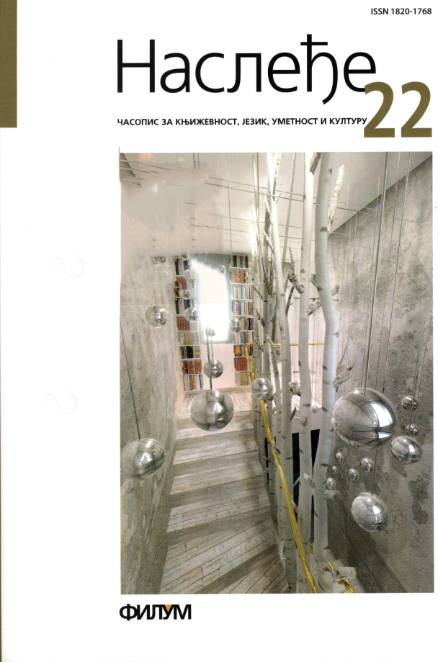MR. W.H. AS A PROBLEM OF FAITH IN WILDE’S READING OF SHAKESPEARE’S SONNETS
Keywords:
Оскар Вајлд, „Портрет господина В.Х.“, Шекспирови Сонети, вераAbstract
Approaching Shakespeare’s legacy in accord with his view that our only duty to history is to rewrite it, Oscar Wilde uses his story “The Portrait of Mr. W.H.” to create a fictitious revision of the Victorian comprehension of the Bard’s Sonnets, entering the process of “disclosing” the person they are dedicated to. With his (quasi-)revisionist method, Wilde contextualizes Shakespeare within Plato’s concept of love in order to destabilize the heteronormative social imperatives of his age, while simultaneously postulating a creative model of literary criticism, out of which faith looms as an unexpected instigating principle. Rejecting rationality as a universal parameter of the value of ideas and defying the gnoseological patterns of Protestantism and positivism, Wilde’s text constitutes itself within the ensuing semantic vacuum as a parable of the (im)possibility of spiritual cognizance through faith.
References
Бексон 1996: K. Beckson, I Can Resist Everything Except Temptation: and Other Quotations from Oscar Wilde, New York: Columbia University Press.
Бешфорд 1998: B. Bashford, Hermeneutics in Oscar Wilde's “The Portrait of Mr. W.H.”, Papers on Language and Literature, 24, 4, 412-22.
Вајлд 1998: O. Wilde, Complete Shorter Fiction, Oxford: Oxford University Press.
Вајлд 2000: O. Wilde, The Picture of Dorian Gray, London: Penguin Books.
Вајлд 2003: O. Wilde, Complete Works of Oscar Wilde, M. Holland (ed.), New York: HarperCollins.
Вајлд 2007: O. Wilde, The Complete Works of Oscar Wilde: Historical Criticism, Intentions, the Soul of Man, Volume 4, J. Guy (ed.), Oxford: Oxford University Press.
Ганије 1986: R. Gagnier, Idylls of the Marketplace: Oscar Wilde and the Victorian Public,
Stanford: Stanford University Press.
Грин 1939: J. Green, Personal Record, New York and London: Harper & Brothers Publishers.
Дерида 1974: J. Derrida, Of Grammatology, Baltimore: The Johns Hopkins University Press.
Дилтај 2006: W. Dilthey, The Understanding of Other Persons and Their LifeExpressions, The Hermeneutics Reader, K. Mueller-Vollmer (ed.), New York: The Continuum Publishing Company.
Елман 1988: R. Ellmann, Oscar Wilde, New York: Alfred A. Knopf.
Иглтон 2004: T. Eagleton, Saint Oscar, London: Bookmarks Publications.
Килин 2008: J. Killeen, Teaching Oscar Wilde: “The Portrait of Mr. W. H.” and the Crisis of Faith in Victorian England and English Studies, P. E. Smith II (ed.), Approaches to Teaching the Works of Oscar Wilde, New York: MLA, 196-211.
Ниче 1999: F. Nietzsche, Nachlaß 1869-1874, G. Colli (ed.), M. Montinari (ed.),
München: Deutscher Taschenbuch Verlag GmbH & Co. KG.
Њумен 2010: J.H. Newman, An Essay in Aid of a Grammar of Assent, Cambridge: Cambridge University Press.
Пирсон 1975: H. Pearson, The Life of Oscar Wilde, London: Macdonald and Jane’s.
Хенон 1991: P. Hannon, Aesthetic Criticism, Useless Art: Wilde, Zola, and “The
Portrait of Mr. W. H.”, R. Gagnier (ed.), Critical Essays on Oscar Wilde, New York: G.K. Hall & Co., 186-201.
Холанд, Харт-Дејвис 2000: M. Holland, R. Hart-Davis, The Complete Letters of Oscar Wilde, New York: Henry Holt and Company.






